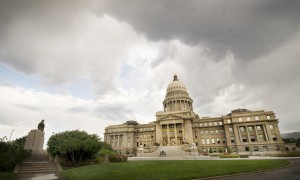Idaho’s Health Insurance Exchange Group Makes Recommendation; Decision Now Rests With Gov. Otter
Governor C.L. “Butch” Otter’s 13-member health insurance exchange working group says Idaho should pursue a state-based health insurance exchange for 2014. The panel arrived at that decision today, months after the Supreme Court upheld the federal Affordable Care Act, landing the issue back in the laps of state leaders.
Committee member Alex LaBeau, president of the Idaho Association of Commerce and Industry, made the impassioned argument that ultimately won out. “What is in the best interest of the employers in the state of Idaho?” he asked. “How can we mitigate this massive increase in their costs that’s coming? The only way is to pursue a state-based exchange.”
Two work group members — Rep. Lynn Luker (R-Boise) and the Idaho Freedom Foundation’s Wayne Hoffman – disagreed. Hoffman encouraged the committee to “keep the federal government from implementing this unconscionable law.” Luker wanted to put off the decision for a year.
Health insurance exchanges are a key component of the federal health care law. Essentially, they’re marketplaces that let consumers compare and purchase health insurance plans. Initially, state leaders understood that if they didn’t create a state-based exchange, Idaho would be drawn into a federally-administered exchange. Since this spring, a third, middle-road option has come to the fore: the partnership exchange. That model allows a mix of federal and state decision-making.
Before the working group arrived at its recommendation this afternoon, its members heard presentations from four consulting groups. All are involved in helping other states implement insurance exchanges, and each delivered what was, in effect, a sales pitch for its own services. Embedded in those pitches were varying opinions about Idaho’s options at this stage.
Utah-based Leavitt Partners made the strongest case that Idaho still has time to create and implement a state-based exchange by 2014. That’s despite a fast-approaching Nov. 16 deadline by which states have to submit exchange blueprints detailing their plans.
“We believe, based upon our conversations with folks within your state as well as vendors, that this is achievable and attainable if you act quickly and that’s your objective,” said Leavitt’s Dan Schuyler. “It doesn’t mean it’s attainable and you can take as much time as you want; it is attainable if you aggressively go after it.”
Representatives from Virginia-based Cognosante were far less bullish on Idaho’s prospects for establishing a state-run exchange by the 2014 deadline. The company is currently working to set up Oregon’s health insurance exchange.
“We personally believe that the partnership model is the best way to go at this late date,” the company’s Director of Health Insurance Exchange Cathy Graeff said. “There are many human aspects that are not IT-related that are going to take time, and time may not be your friend if you’re intending on bringing up a state-based exchange in 2014.”
In the end, it was Leavitt Partners’ view that the work group found most persuasive.
This isn’t the first time a panel of state leaders has evaluated Idaho’s options and determined that the state should establish a state-run exchange. In January of this year, the Legislature’s Joint Health Care Task Force endorsed legislation to establish an Idaho exchange. The Idaho Department of Insurance encouraged state lawmakers to adopt a state-based exchange before the 2012 legislative session. Lawmakers chose not to act. Roughly a year later, the same recommendation has been made again.
The decision now rests with Gov. Otter. Press secretary Jon Hanian said this morning that the governor may not follow his work group’s recommendation. “Obviously, he paneled this group,” Hanian said. “He wanted them to weigh all of the factors in determining what our options are. He’ll weigh their decision and then make his own.”



